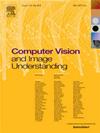半监督图像标题生成对抗网络
IF 4.3
3区 计算机科学
Q2 COMPUTER SCIENCE, ARTIFICIAL INTELLIGENCE
引用次数: 0
摘要
传统的有监督图像标题方法通常依赖大量图像和配对标题进行训练。然而,创建这样的数据集需要大量的时间和人力资源。因此,我们提出了一种新的半监督图像字幕算法来解决这个问题。建议的方法使用生成式对抗网络生成与标题匹配的图像,并将这些生成的图像和标题作为新的训练数据。这就避免了用自回归法生成伪标题时的误差积累问题,网络可以直接进行反向传播。同时,为了确保生成的图像和字幕之间的相关性,我们引入了 CLIP 模型进行约束。CLIP 模型已在大量图像-文本数据上进行了预训练,因此在图像和文本的语义配准方面表现出色。为了验证我们方法的有效性,我们在 MSCOCO 离线 "Karpathy "测试分片上进行了验证。实验结果表明,当使用 1%的配对数据时,我们的方法能显著提高模型的性能,CIDEr 分数从 69.5% 提高到 77.7%。这表明我们的方法可以有效地利用无标记数据来完成图像标题任务。本文章由计算机程序翻译,如有差异,请以英文原文为准。
Generative adversarial network for semi-supervised image captioning
Traditional supervised image captioning methods usually rely on a large number of images and paired captions for training. However, the creation of such datasets necessitates considerable temporal and human resources. Therefore, we propose a new semi-supervised image captioning algorithm to solve this problem. The proposed method uses a generative adversarial network to generate images that match captions, and uses these generated images and captions as new training data. This avoids the error accumulation problem when generating pseudo captions with autoregressive method and the network can directly perform backpropagation. At the same time, in order to ensure the correlation between the generated images and captions, we introduced the CLIP model for constraints. The CLIP model has been pre-trained on a large amount of image–text data, so it shows excellent performance in semantic alignment of images and text. To verify the effectiveness of our method, we validate on MSCOCO offline “Karpathy” test split. Experiment results show that our method can significantly improve the performance of the model when using 1% paired data, with the CIDEr score increasing from 69.5% to 77.7%. This shows that our method can effectively utilize unlabeled data for image caption tasks.
求助全文
通过发布文献求助,成功后即可免费获取论文全文。
去求助
来源期刊

Computer Vision and Image Understanding
工程技术-工程:电子与电气
CiteScore
7.80
自引率
4.40%
发文量
112
审稿时长
79 days
期刊介绍:
The central focus of this journal is the computer analysis of pictorial information. Computer Vision and Image Understanding publishes papers covering all aspects of image analysis from the low-level, iconic processes of early vision to the high-level, symbolic processes of recognition and interpretation. A wide range of topics in the image understanding area is covered, including papers offering insights that differ from predominant views.
Research Areas Include:
• Theory
• Early vision
• Data structures and representations
• Shape
• Range
• Motion
• Matching and recognition
• Architecture and languages
• Vision systems
 求助内容:
求助内容: 应助结果提醒方式:
应助结果提醒方式:


